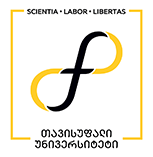University Today 2
07 აპრილი 2018
Key Statistics:
|
2315 |
Undergraduate Students |
|
528 |
New Undergraduate Enrolment |
|
90% |
Average Freshmen Retention Rate |
|
88% |
United National Exam score in 90th percentile |
|
90% |
Classes with Less than 40 Students |
|
9:1 |
Student-Faculty Ratio |
|
$1200 |
Average Effective Annual Tuition Fee |
|
94% |
Employment Rate upon Graduation |
University Today:
Free University of Tbilisi was founded by The Knowledge Fund in 2007 on the basis of European School of Management in Tbilisi (ESM) and Institute of Asia and Africa (IAA). In 2017, both ESM and IAA celebrated 25 years since their opening and 10 years as part of Free University.
Free University is one of the leaders in the educational sphere in Georgia. The university stands out with its high quality of education, modern learning environment and high employment level of graduates.
In 2011-2017 there has been an incremental increase in the number of students - from 904 to 2428 students. As of February 2018, there are 2100 Bachelor students, 316 Master students and 12 PhD students.
Free University has been consistently placed first in rankings, according to the average scores of applicants. Notwithstanding the increase in the number of students, the average score of entrants is constantly improving - in 2017, the average score was 2132.
Over the years, high quality of education at Free University has been manifested in high employment level of graduates - immediately after graduation, 94% of graduates are employed in their professional occupation. Despite the increase in the number of students, Free University also maintained high position in the ratings and employment levels of its graduates.
Schools:
- Business School (ESM)
- International Relations School
- Law School
- Management and Social Sciences School
- Mathematics and Computer Science School (MACS)
- Physics School
- Visual Arts and Design School (VA[A]DS)
- Doctoral School
Degree Programmes:
9 Bachelor's Degree Programmes:
- Business Administration
- International Relations
- Law
- Computer Science and Mathematics
- Electrical and Computer Engineering
- Management and Social Sciences
- Physics
- Architecture
- Visual Art & Design
5 Master’s Degree Programmes:
- Social Sciences
- Natural Sciences (Joint Programme with Agricultural University)
- Business Administration (MBA)
- Business Administration in Operations Management (MBA in OM)
- Business Law (LLM)
2 PhD Programmes:
- PhD in Social and Humanitarian Sciences
- PhD in Natural Sciences (Joint Programme with Agricultural University)
Open-enrollment programs:
- Certified Business Administrator (CBA)
- Certified Financial Manager (CFM)
- Certified Administrative Manager (CAM)
- Project Management (PMC) College: “Project Management” and “Program Management” programmes in cooperation with George Washington University, ESI International and BP
- Chinese Language Courses (beginners to advanced, officially recognized certification)
- Other Languages (Arabic, Turkish, Persian, Japanese, Korean)
Research institutes and centres:
- National Centre of Business Law;
- National Institute of Human Rights;
- Centre of Arab countries and the Islamic World;
- Research Institute of Cognitive Neuroscience;
- Confucius Institute;
- Institute of Asia and Africa.
The aim of Free University is to have a "short" hierarchical chain and a "lean" organizational structure in order to shorten the distance on one hand between students and the learning process and on the other hand, to speed up the decision-making process. For this purpose, University constantly grows the effectiveness of the management. As an indicator, distribution of gross payroll expenses clearly reflects the hierarchical layers - according to the expenditure for the year 2017, administrative wage costs at Free University amounted to only 25% of the total gross salary fund.
Decision making at Free University is based on project management principles – for each issue there is a task and for each task an appropriate working group is formed. The working group is responsible for tasks’ performance within the given timeline. After achieving the objectives, the group is dismissed. For each new issue, a relevant working group will be formed again.




